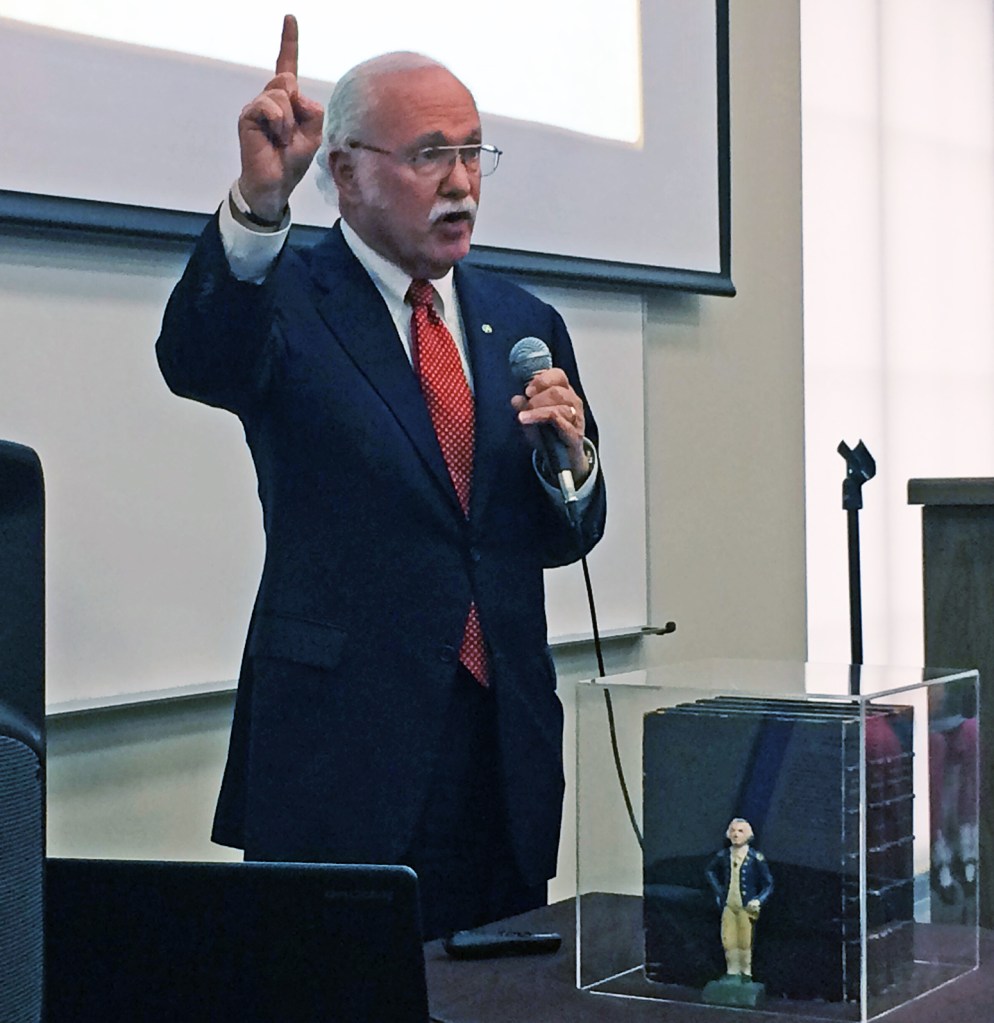BY THE BOOK: Justice Parker talks influence of Blackstone on U.S.
Published 6:30 am Wednesday, February 22, 2017

- Alabama Supreme Court Justice Tom Parker gives a presentation Tuesday on Sir William Blackstone's Commentaries on the Laws of England. Parker owns two early pressings of the four-volume sets and talked about how Blackstone's influence shaped the Constitution and Declaration of Independence.
Alabama Supreme Court Justice Tom Parker stood behind a lectern Tuesday at the Athens-Limestone Public Library, flanked on either side by two sets of books.
To the untrained eye, they may have looked like old, dusty books of little consequence. To Parker, however, they are the foundations for the rule of law and the United States Constitution.
Trending
The four-volume sets are Sir William Blackstone’s Commentaries on the Laws of England, and Parker owns two sets. Parker, who has been on the Alabama Supreme Court since 2004, provided the detailed and unique history behind each set of the books to the dozens in attendance.
The set Parker is most fond of are what he referred to as a mixed first edition. Blackstone’s books were originally published in 1765, 1766, 1767 and 1769. Blackstone was an English judge and jurist, but his philosophy and treatises were more popular in early America than in England.
Parker bought his first set at auction in New York City. Before he purchased the set, it was owned by the Bar Association of New York. It had at least one very famous owner, however — Martin Van Buren, the eighth president of the United States.
He drew parallels between Blackstone’s words and those found in the Declaration of Independence. Parker showed how Blackstone’s influence can be seen in a number of topics, including the right to petition, taxation and the king’s protection of his subjects.
“I bought this … because of the impact it had on our country,” Parker said.
Parker then connected the dots of all the previous owners of the books and what their role was in shaping the foundations of the country. He also discussed the early popularity of the books, which were pre-ordered by 1,400 people. John Adams was at the top of the alphabetical list.
Trending
Early origins
Parker’s mixed first edition set was first owned by Edmund Rush Wegg, who was the attorney general of British West Florida. The territory spanned from roughly Apalachicola to the Mississippi River and north to near Wetumpka.
“This set of books originated in Alabama!” Parker said excitedly. “Can you believe the providence of God that he would allow me to return them to Alabama where it originated?”
As proof of how early statesmen were influenced by Blackstone, Parker cited a book about Wegg’s protest of the Stamp Act. The book, by Kathleen DuVal, claims Wegg said Florida had no right to levy taxes on the colonies without their consent and charged no man can be bound to any government unless his own consent is conveyed by either himself or a representative.
The second owner of the set was William Wylly, who once served as attorney general of the Bahamas. He may be best known, however, as an abolitionist after he began a correspondence with William Wilberforce, another abolitionist and philanthropist. Wilberforce’s mentor was John Newton, author of “Amazing Grace.”
The books were next owned by William Jones, who fought with George Washington at the Battle of Trenton. He was imprisoned on a British prison ship, but was ultimately traded for a British officer. Jones would later become secretary of the Navy under James Madison. Van Buren would become the next owner of the books.
Parker’s other set of Blackstone’s works were published in 1783 and were first owned by John Lansing Jr., who was one of 50 delegates in the 6th Continental Congress. He also served as speaker of the New York Assembly and was one of three New York delegates at the 1787 Constitutional Convention.
Lansing and another delegate, Robert Yates, walked out of the convention because they thought the document infringed on individual liberties and sovereignty of existing states.
Despite his love for both sets, Parker said he reads Blackstone’s words from a modern reproduction to avoid damaging the originals.
Parker was invited to speak by the Limestone County Republican Party.





